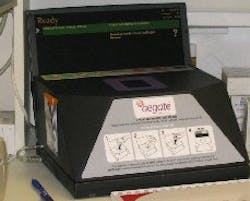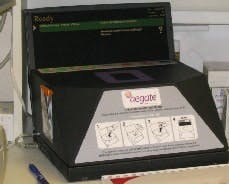Merck, Lilly Recalls Test RFID During Pilot
By Paul Thomas, Managing EditorRFID can definitely do recalls. Thats one of the clear lessons learned from a recent three-month RFID/barcoding pilot study managed by the U.K. consulting firm Aegate, a spinoff of PA Consulting Group devoted to combating pharmaceutical fraud. Technologies put in place to test simulated drug recalls ended up facilitating the real-life recalls of Vioxx and Cialis in the U.K.The study involved the use of barcoding and RFID labeling at just two points in the supply chain at the manufacturer and pharmacist. It aimed to test whether the two technologies could enable real-time oversight (via online data monitoring) at the point of sale in order to better protect patients and enhance anti-counterfeiting and product recall measures.The pilot also brought branded and generics manufacturers together: Merck Generics UK, Merck Pharmaceuticals, Novartis, Schering Health Care and Solvay all participated.Several important lessons were learned, says Aegate spokesperson Alison Williams. We spoke with Williams to find out more.
Successful Aegate Pharma Pilot Demonstrates Potential to Improve Patient Safety Using RFID and Barcode Technology Revealed today, results of a three month pilot, carried out by Aegate, a PA Group Company, in association with BT, show that fraudulent medicines can be identified at the point of dispensing; increasing patient safety and improving the service provided by pharmacists. The results of the pilot confirm that radio-frequency identification (RFID) tags and printed barcodes can be mass-deployed and that pharmacists are keen to gain the advantages of this technology. They also highlight opportunities to support the dispensing process and provide compelling evidence of the value of uniquely identifying medicines. Forty-four pharmacies across England and Wales took part in the pilot between October 2004 and January 2005. These included independent community pharmacies, pharmacy chains, hospital pharmacies and doctors dispensaries. Six drug manufacturers took part including Merck Generics UK, Merck Pharmaceuticals, Novartis, Schering Health Care and Solvay. More than 180,000 pharmaceutical products, ranging from needles to Nurofen, were scanned at the point of dispensing. Approximately 20,000 products were tagged with either a barcode or an RFID tag containing a unique number. When checked by the pharmacist using Aegates custom-built scanner, the drug was authenticated if it matched details on a secure database, and rejected if not recognised. In the UK, 11 per cent of all hospital admissions are due to medication errors, and there is a growing problem of fraudulent drugs. The pilot has shown that authentication at the point of dispensing is a simple scanning process and can reduce the risk of errors as well as alert dispensers to illegal, expired or recalled products before they are given to the patient. This is important in light of increasing concerns about the level of dispensing errors being made, particularly as the Department of Health has set a target of reducing errors by 40 per cent. The trial also highlighted improvements that could be made to the way drug recalls are carried out. Several recalls occurred during the pilot and as a result, real time notices were provided to dispensers as they scanned the items. This has led one in four community pharmacies to keep using the scanner even though the pilot has now ended. Fliss Davies, Cordon Pharmacy, said: "We're always interested in ways to help improve the service we provide to our customers, especially if it is related to patient safety. The scanner has proved a very innovative addition to the dispensing process, and the extra checking step has increased our confidence that the selected item is both correctly dispensed and genuine." Ian Rhodes, CEO, Aegate, said: This pilot has shown that mass serialisation of medicines combined with a simple scanning process can greatly reduce both errors and illegal medicines before they are dispensed to the patient. This process is well aligned with the Governments eHealth agenda. As the next investments in eHealth technology start to take effect across the NHS i.e. implementation of broadband and electronic prescriptions, these three elements will create a major advance in patient safety. Ross Hall, CEO, Auto-ID Services, BT, added: Aegates trial has been a huge success, and Im pleased BT Auto-ID Services were able to support it the way we did. This pilot has without doubt proven that RFID can contribute towards improved patient safety in pharmacies, and the applications that can be developed to help build a safer NHS for patients are endless. Were very excited by the results of the trial and were even more excited by the endless possibilities RFID can offer for further improvements in healthcare in the future. Aegates system is technology independent; compatible with a wide range of RFID and barcode based mass serialisation approaches. In the pilot, for both RFID tagged and barcoded products, the average response time was under one second. During this time, the information on the tag was verified via a broadband connection to a secure database and then relayed back to the scanner. Please contact: Alison Williams, Aegate Ltd: tel +44 (0)7714 697148; email [email protected] Suzy Christopher, BT: tel +44 (0)7885 652 235; email [email protected] |

